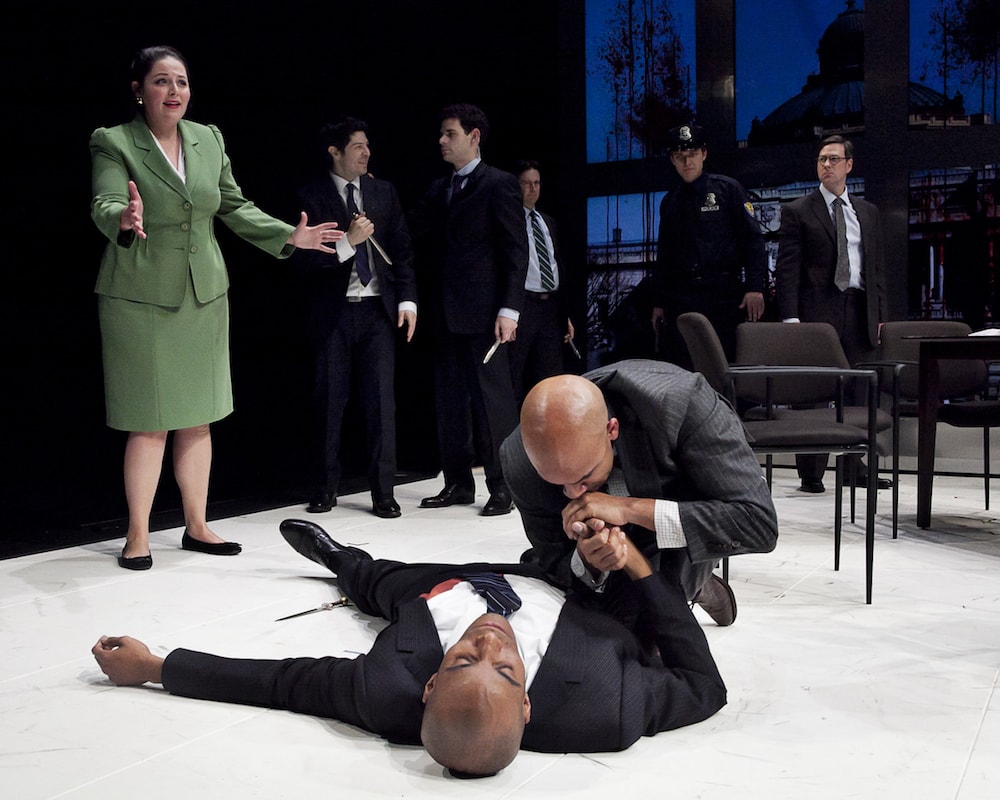NEW YORK CITY: On opening night of the Public Theater’s new production of Julius Caesar, it stands at the center of a firestorm over free speech, artistic license, and the political theatre. Set to play through June 18 at the Delacorte Theatre in Central Park, director Oskar Eustis’s rendition portrays the title character of Shakespeare’s classic as a blonde-haired, long-necktied politician who unmistakeably resembles President Donald Trump, complete with a blonde wife with an Eastern European accent.
At the center of the play that bears his name, of course, is Caesar’s bloody assassination, followed by the the demise of the Roman Republic his assassins had meant to save. For many critics, most of whom haven’t seen (and don’t seem to understand) the play, that stabbing of a Trump-like figure on one of the nation’s most high-profile stages is offensive, even seditious. Mediaite had the first article decrying this portrayal, with Breitbart and Fox News soon following suit. Donald Trump Jr. took to Twitter to ponder, “I wonder how much of this ‘art’ is funded by taxpayers? Serious question, when does ‘art’ become political speech & does that change things?”
By contrast, Chelsea Clinton voiced her support of the Public Theater, saying on Twitter, “My husband Marc & I are proud @PublicTheaterNY supporters and some of my favorite theater memories are from #ShakespeareinthePark!” Though she admitted when challenged that she wouldn’t want to see a production portraying either of her parents as a murdered Julius Caesar, she added, “Would I protest it or complain about it? Definitely not.”
Hi Steven – would I see it? Probably not. Would I protest it or complain about it? Definitely not. https://t.co/utucI72CqV
— Chelsea Clinton (@ChelseaClinton) June 12, 2017
The debate became more than academic when two of the dozen funders of Shakespeare in the Park pulled their support on Sunday night: Delta Air Lines, which pulled its entire contribution, and Bank of America, pulled its name from the list of corporate sponsors for the show. Delta contributes between $100,000 and $499,000 annually to the Public. While Bank of America would not release the amount of its contributions to the Public, a source at the Public Theater said that BofA has not yet pulled funding, just its name, from Julius Caesar. Corporate sponsorship of this kind is what allows the Public to make its Shakespeare in the Park season free to audiences.
The Public Theater did not comment publicly until this afternoon, when it released the following statement in defense of its artistic choice:
We stand completely behind our production of Julius Caesar. We recognize that our interpretation of the play has provoked heated discussion; audiences, sponsors and supporters have expressed varying viewpoints and opinions. Such discussion is exactly the goal of our civically engaged theatre; this discourse is the basis of a healthy democracy. Our production of Julius Caesar in no way advocates violence towards anyone. Shakespeare’s play, and our production, make the opposite point: Those who attempt to defend democracy by undemocratic means pay a terrible price and destroy the very thing they are fighting to save. For over 400 years, Shakespeare’s play has told this story, and we are proud to be telling it again in Central Park.
Our source at the theatre told us that despite the public backlash, calls to the Public have been “overwhelmingly positive,” even among more conservative audience members. The negative responses have chiefly been from people incited by media reports, not “hard-core investors in our mission,” the source said.

A number of people are pointing out that reimagining Julius Caesar for modern times is practically de rigueur for contemporary productions. Indeed, in 2012 at the Guthrie Theater in Minneapolis, Julius Caesar—in a coproduction with the Acting Company—featured a lean black actor in the title role, in a clear reference to then-president Barack Obama, and conspirators who resembled Republican leaders Eric Cantor and Mitch McConnell. The production toured the country, with no backlash (note: Delta is a sponsor of the Guthrie, though it didn’t sponsor the Acting Company’s Julius Caesar).
Said its director, Rob Melrose, “I think both Oskar and I are doing the same thing, which is, whenever you produce this play, you have to think about who is currently in power. I think when you encourage an audience to think that way, it brings the play into people’s lives in a way that’s palpable. One thing that is dumb that’s happening right now is a lot of people aren’t understanding, first of all, the idea of updating Shakespeare and second of all, the idea of theatre itself.”
Melrose pointed out that one needs only to look at the script of Julius Caesar, or to see the production, to know that the play does not condone regicide—in fact, sees it as a disaster, even in opposing tyranny. As Eustis himself writes in program for the Public production, “Julius Caesar is about how fragile democracy is. The institutions that we have grown up with, that we have inherited from the struggle of many generations of our ancestors, can be swept away in no time at all.”
Theatre itself may be seen as one of those institutions, Melrose said. In contrast to the false oppositions presented by much cable news, theatre “is a wonderful place of political discourse, because you can offer many points of view for a long period of time. You can have two hours, you have feelings, suffering, and humanity in the equation, which you can’t do on Bill O’Reilly’s show. I think this is the time theatre should assert itself. Theatre is the best place for political dialogue, and it should absolutely not relinquish its important role as a place of political discourse because funders are threatened to pull out. Funders need to understand what theatre’s role is, and what purpose it serves to society.”
The Public Theater may not need to worry; the pulling of sponsorships and donors has not continued to pile on past the initial two, and our source at the Public indicated that there are many options on the table going forward, even indicating that standing by their work may make the theatre more attractive to the right sponsors.
Tonight before the show began, Eustis took to the stage and said, in part: “We are here to uphold the Public’s mission. And the Public’s mission is that the culture belongs to everybody, needs to belong to everybody, to say that art has something to say about the great civic issues of our time and to say that, like drama, democracy depends on the conflict of different points of view. Nobody owns the truth. We all own the culture.”
*A previous version of this story erroneously stated that Delta was a sponsor of the Guthrie’s Julius Caesar. It has been corrected.


